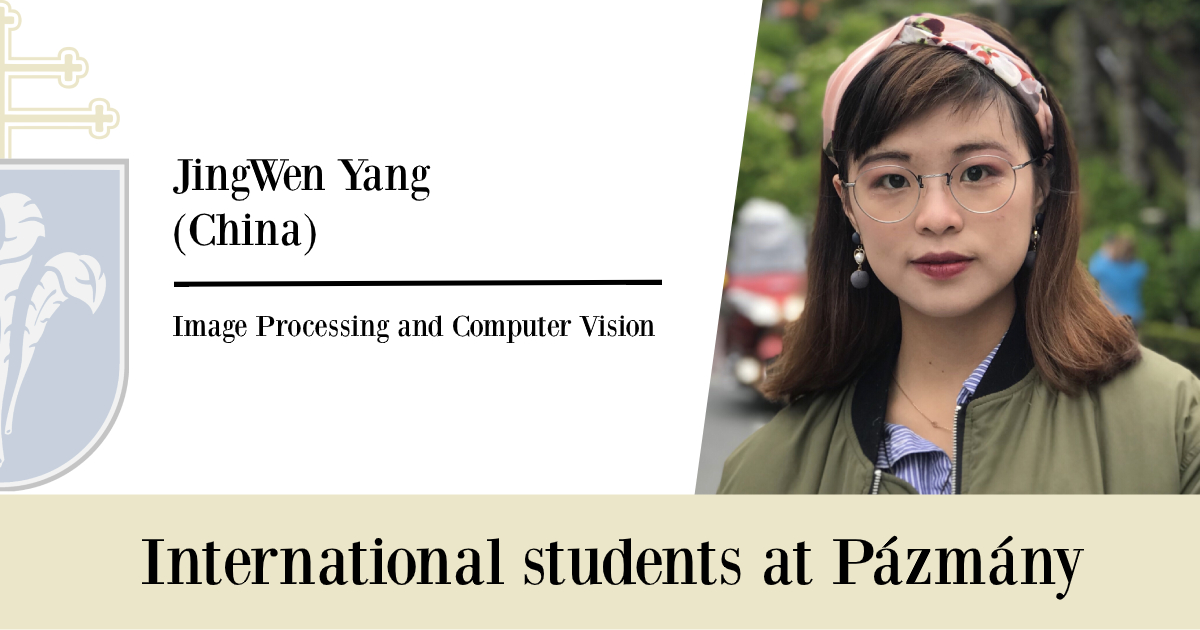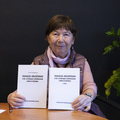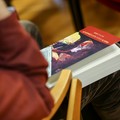
JingWen Yang is from China. Thanks to the Image Processing and Computer Vision (IPCV) masters program, she changed her major from Geographical Information System to Computer Vision, which she is really happy about. After graduation, she would like to work on self-driving in Europe.
Please tell us a few words about yourself.
I am JingWen Yang. I am from China. I have a Bachelor of Engineering degree in Geographical Information System. I am currently studying in the Image Processing and Computer Vision program of Pázmány University.
The competition was huge, students went through a very serious selection, and there is twenty times oversubscription from all over the world. Why do you think image processing and computer vision are so current today? How did you feel when you found out you had been selected into the Image Processing and Computer Vision master program?
I was very happy. This program was one of my dream offers. I didn’t hesitate much to accept it. I was participating in some research in the labs in during my bachelor studies. They are all using deep learning methods doing research in pattern recognition, object tracking, etc. I think these techniques can be applied in any field in the real world.
What can you do with this triple degree? In which fields can it be used?In your opinion, what is the added value that an international master's degree can give? It is international in two senses: on the one hand, you study at three universities (Pázmány Péter Catholic University, Hungary, Universidad Autónoma de Madrid, Spain, and Université de Bordeaux, France, respectively), and on the other hand, your classmates are ambitious, talented students from all over the world.
I believe this triple degree can enable me to work in research labs of companies who work in the field of computer vision such as self-driving, virtual reality, robotics, biomedical imaging.
I love to live in different cities, exploring the local culture, always experiencing new stuff. During holidays I travel around the country or to the neighboring countries. I love it, especially going with the friends I made in the IPCV program. We always talk about our differences, we also see our differences in daily life. We cook our traditional food for each other. We have been going through the pandemic together. We support each other. It was amazing to meet all my classmates.
What does the IPCV program give to you? You spent the first semester of your studies at Pázmány Péter Catholic University; at the moment you are in your third semester in Bordeaux, France. How did you like Pázmány, and what was the best thing about it?
I met many international students. Some of them have become really good friends. I have travelled to several countries, and I really enjoyed it. It helped me change my major from Geographical Information System to Computer Vision, which I am really happy about.
I think it gave me the fundamental knowledge in entering the field of computer vision. Some of the professors are very nice and inspiring.
What is your personal goal, and what would be your message to students who are thinking about applying to the Image Processing and Computer Vision Master program?
I wish I could work on self-driving cars in Europe after my master's degree. The IPCV is a program suitable for people who like both computer vision and travelling. The workload is sometimes really intense, but at the same time it is also very helpful. Apart from study, you make friends with your classmates very soon. My advice is to make the most of this master program. Travel with your classmates. Enjoy your master study.
_______________________________________
JingWen Yang Kínából érkezett. A Képfeldolgozás és Gépi Látás (Image Processing and Computer Vision) mesterképzési programnak köszönhetően irányt váltott, és eredeti Geoinformatika mesterképzési tanulmányai helyett az IPCV programot választotta, amivel nagyon elégedett. Európában szeretne elhelyezkedni, az önvezető járművek területén.
Kérem, röviden mutatkozzon be.
JingWen Yang vagyok, kínai. Geoinformatikából szereztem BSc diplomát. Jelenleg a Pázmány Egyetemen, az IPCV mesterképzési programon tanulok.
Hatalmas volt a verseny, a hallgatók nagyon komoly válogatáson mentek keresztül, a világ minden tájáról húszszoros a túljelentkezés. Mit érzett, amikor megtudta, hogy bekerült az IPCV programba? Mit gondol, a képfeldolgozás és a gépi látás miért olyan aktuális a mai világban?
Nagyon örültem, hiszen ez a program volt az egyik legnagyobb vágyam. Nem haboztam sokat, hogy elfogadjam a felajánlott helyet. Az egyetemen, ahol az alapképzést végeztem, részt vettem néhány laboratóriumi kutatásban. Mindegyik deep learning módszereket alkalmazott a mintafelismerés, tárgykövetés stb. kutatásában. Azt hiszem, ezek a módszerek az élet bármely területén alkalmazhatók.
Mihez tud kezdeni ezzel a három diplomával? Mely területeken használható? Véleménye szerint milyen többletet adhat egy nemzetközi mesterképzés, ami két értelemben is nemzetközi: egyrészt három egyetemen végzi tanulmányait [sorrendben Pázmány Péter Katolikus Egyetem (Magyarország), Universidad Autónoma de Madrid (Spanyolország), illetve Université de Bordeaux (Franciaország)], másrészt csoporttársai a világ minden tájáról érkező ambiciózus, tehetséges hallgatók.
Úgy gondolom, a hármas diploma segíthet abban, hogy olyan cégek laboratóriumaiban dolgozhassak, ahol gépi látással foglalkoznak, ezen belül például az önvezető járművekkel, virtuális valósággal, robotikával, orvosbiológiai képalkotással. Szeretek különböző városokban élni, felfedezni a helyi kultúrát, mindig új dolgokat tapasztalni. A szünidők alatt bejárom az adott országot és a szomszédos országokat. Ezt nagyon szeretem, különösen, ha az IPCV program során szerzett barátaimmal utazhatok. Gyakran megvitatjuk, miben különbözünk egymástól, a mindennapokban is látjuk ezeket a különbségeket. Hagyományos ételeinket főzzük egymásnak. Együtt éljük át a járványt. Támogatjuk egymást. Fantasztikus dolog volt megismerni a csoporttársaimat.
Mit ad Önnek az IPCV program? Tavaly az első szemesztert töltötte a Pázmány Péter Katolikus Egyetemen, jelenleg harmadik szemeszterét végzi Bordeaux-ban. Hogy tetszett a Pázmány, mi volt a legjobb élménye nálunk?
Sok nemzetközi hallgatóval találkoztam, néhányan jó barátaim is lettek. Több országba elutazhattam, amit nagyon élveztem. A képzés segített abban is, hogy irányt módosítsak: a geoinformatikáról a gépi látásra váltottam, amit nem bántam meg.
A Pázmányon alapvetően a gépi látás alapfogalmait ismerhettem meg. Néhány oktató nagyon kedves és inspiráló volt számomra.
Milyen céljai vannak? Mi lenne az üzenete azon fialatok számára, akik az IPCV programon gondolkodnak?
Szeretném, ha a mesterképzés után Európában az önvezető járművek fejlesztésén dolgozhatnék. Az IPCV mesterképzési program azok számára hasznos, akiket érdekel a gépi látás, és szeretnek utazni. A munkaterhelés néha nagyon nagy, ami azonban egyúttal nagyon hasznos is. A tanulás mellett hamar megismerheted a csoporttársaidat is. Hozd ki a legtöbbet ebből a képzésből. Utazz a társaiddal, és élvezd a tanulást.
Készítette: PPKE Kommunikáció/Kemény Mária
Fotó: JingWen Yang



